Pronoun in Hindi | Definition of Pronoun in Hindi(सर्वनाम)
Definition of Pronoun in Hindi (सवर्नाम की परिभाषा)
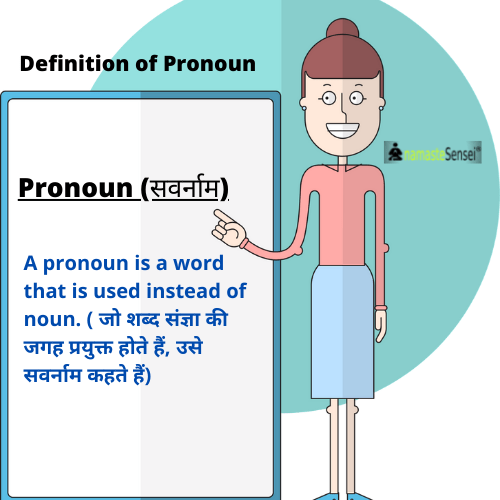
Definition of Pronoun in Hindi – A pronoun is a word that is used instead of noun. ( जो शब्द संज्ञा की जगह प्रयुक्त होते हैं, उसे सवर्नाम कहते हैं)
- आम तौर पर (लेकिन हमेशा नहीं) Pronoun Stands for (Pro + Noun). Pronoun refers to a noun, An individual or individuals (एक व्यक्ति या एक से ज्यादा व्यक्ति), thing or things (चीज या चीजें) whose identity is made clear earlier in the text. (जिसकी पहचान पहले वाक्य में स्पष्ट की जाती है।)).
Example of Pronoun in Hindi (सर्वनाम के उदाहरण)
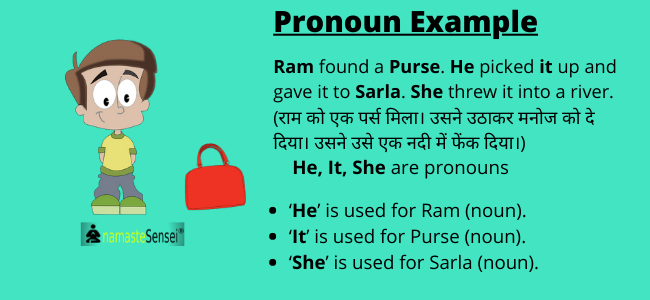
- Ram found a Purse. He picked it up and gave it to Sarla. She threw it into a river. (राम को एक पर्स मिला। उसने उठाकर मनोज को दे दिया। उसने उसे एक नदी में फेंक दिया।)
In the above sentence (उपरोक्त वाक्य में)
- ‘He’ is used for Ram (noun). (राम के लिए ‘He‘ का प्रयोग किया गया है।)
- ‘It’ is used for Purse (noun). (पर्स के लिए ‘It’ का प्रयोग किया गया है।)
- ‘She’ is used for Sarla (noun). ( सरला के लिए ‘She’ का प्रयोग किया गया है।)
- He, It, She are pronouns used in place of noun. As the nouns (Ram, Purse, Sarla) are clearly identified earlier. (He(वह), It, She संज्ञा के स्थान पर प्रयुक्त सर्वनाम हैं। संज्ञा के रूप में (राम, पर्स, सरला) पहले स्पष्ट रूप से पहचाने जाते हैं।)
- (Ram, Purse, Sarla) are antecedents of pronoun (he, it, she). ((Ram, Purse, Sarla) सर्वनाम के पूर्ववर्ती हैं (He, She, it)।)
Pronoun and antecedent (सर्वनाम और पूर्ववृत्त)
-
What is antecedent?
- The word that the pronoun replaces is called its antecedent. (जिस शब्द के स्थान पर सर्वनाम आ जाता है, वह उसका पूर्ववृत्त कहलाता है।)
- It is not necessary that all pronouns will refer to an antecedent.(यह आवश्यक नहीं है कि सभी सर्वनाम पूर्ववृत्त का ही उल्लेख करें।)
Example of a pronoun with no antecedent. (बिना पूर्ववृत्त वाले सर्वनाम का उदाहरण।)
- Everyone here earns over a thousand dollars a day. (यहां सभी एक दिन में एक हजार डॉलर से ज्यादा कमाता है।)
The word ‘everyone’ (pronoun) has no antecedent. (‘सभी‘ (सर्वनाम) शब्द का कोई पूर्ववृत्त नहीं है।)
Types of Pronouns in Hindi (सर्वनाम के प्रकार)
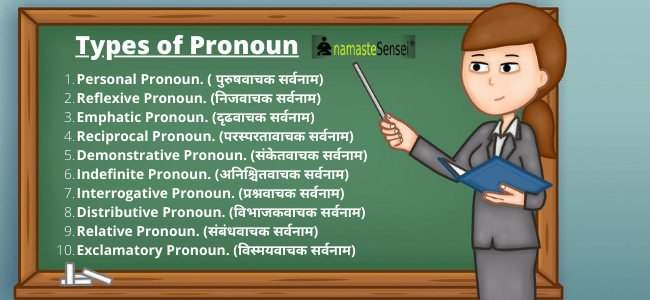
- Personal Pronoun. ( पुरुषवाचक सर्वनाम)
- Reflexive Pronoun. (निजवाचक सर्वनाम)
- Emphatic Pronoun. (दृढवाचक सर्वनाम)
- Reciprocal Pronoun. (परस्परतावाचक सर्वनाम)
- Demonstrative Pronoun. (संकेतवाचक सर्वनाम)
- Indefinite Pronoun. (अनिश्चितवाचक सर्वनाम)
- Interrogative Pronoun. (प्रश्नवाचक सर्वनाम)
- Distributive Pronoun. (विभाजकवाचक सर्वनाम)
- Relative Pronoun. (संबंधवाचक सर्वनाम)
- Exclamatory Pronoun. (विस्मयवाचक सर्वनाम)
-
Personal Pronoun in Hindi (पुरुषवाचक सर्वनाम)
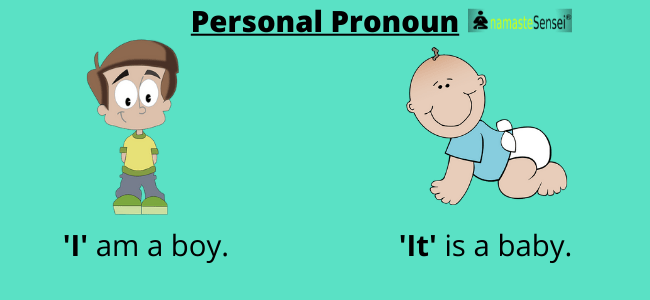
Definition of Personal pronoun
- The pronouns which describe the person in the sentence are called Personal pronouns. (वे सर्वनाम जो वाक्य में व्यक्ति का बोध कराते हैं, पुरुषवाचक सर्वनाम कहलाते हैं।)
Examples of a Personal Pronoun in Hindi. (पुरुषवाचक सर्वनाम के उदाहरण)
- I am a boy.(मैं एक लड़का हूँ।)
- You are a girl. (तुम एक लड़की हो।)
- He is a man. (वह एक आदमी है।)
- It is a child. (यह एक बच्चा है।)
- She plays hockey. (वह हॉकी खेलती है।)
- We are boys. (हम लड़के हैं।)
- You are girls. (तुम लड़कियां हो।)
- They are men. (वो पुरुष है।)
- They are children. (वो बच्चे हैं।)
- In the above sentences I, We, express first person. You express second person and He, She, It, They, express third person. All of them are Personal Pronoun. (उपरोक्त वाक्यों में I, We, First Person को व्यक्त करते हैं। You, Second person को व्यक्त करता है। और He, She, It, They, Third Person को व्यक्त करते हैं। वे सभी पुरुषवाचक सर्वनाम हैं।)
Read This Also – Personal Pronoun in Hindi in detail (इसे भी पढ़ें – पुरुषवाचक सर्वनाम हिंदी में विस्तार से)
-
Reflexive Pronoun in Hindi. (निजवाचक सर्वनाम)

Definition of Reflexive Pronoun
- Reflexive Pronoun are made by adding ‘self’ in (My, your, him her and it). (निजवाचक सर्वनाम My, your, him, her and it में ‘self’ जोड़कर बनते हैं।) and by adding ‘selves’ in (our, your and them). (और (in, your and them) में ‘selves‘ जोड़कर।)
- Reflexive Pronoun are called reflexive because the action done by the subject turns back (reflects) upon the subject. (निजवाचक सर्वनाम को निजवाचक इसीलिए कहा जाता है क्योंकि Subject द्वारा की गई क्रिया Subject पर वापस (reflect) होती है।)
- Therefore, In reflexive pronoun the action performed by the subject has impact on the subject itself. (अत: कर्मवाचक सर्वनाम में विषय द्वारा की गई क्रिया का प्रभाव विषय पर ही पड़ता है।)
Examples of Reflexive Pronoun. (निजवाचक सर्वनाम के उदाहरण)
- He hurt himself. (उसने स्वयं को आघात पहुंचाया।)
- We ruined ourselves. (हमने खुद को बर्बाद कर लिया।)
- You ruined yourself. (तुमने खुद को बर्बाद कर लिया।)
- I hurt myself. (मैंने अपने आप को चोट लगाई।)
- They ruined themselves. (उन्होंने खुद को बर्बाद कर लिया।)
- She ruined herself. (उसने खुद को बर्बाद कर लिया।)
- In the above sentences the actions performed by he, we, you, I, they, she has impact on themselves. (उपरोक्त वाक्यों में he, we, you, I, they, she जो कर्म किए, उसका प्रभाव उन पर ही पड़ा।)
-
NOTE– Emphatic Pronoun are used just after the Subject. (दृढवाचक सर्वनाम का प्रयोग Subject के ठीक बाद किया जाता है।)
-
Emphatic Pronoun in hindi (दृढवाचक सर्वनाम)
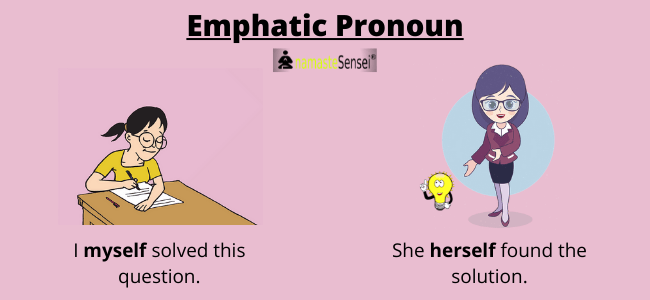
Definition of Emphatic Pronoun
- Reflexive pronoun and Emphatic pronoun almost look similar. Emphatic Pronouns are used to put some emphasis on either noun or pronoun. (निजवाचक सर्वनाम और दृढवाचक सर्वनाम लगभग समान दिखते हैं। दृढवाचक सर्वनाम का प्रयोग किसी संज्ञा या सर्वनाम पर कुछ जोर देने के लिए किया जाता है।)
Example of Emphatic Pronoun (दृढवाचक सर्वनाम के उदाहरण)
- I myself solved this question. (मैंने खुद इस सवाल का हल निकाला।)
- She herself found the solution. (उसने खुद ही इसका हल ढूंढ लिया।)
- He himself came to see the patient. (वह खुद मरीज को देखने आया थे।)
- You yourself admitted you fault. (आपने खुद अपनी गलती स्वीकार की।)
NOTE– Emphatic Pronoun are used just after the Subject. (दृढवाचक सर्वनाम का प्रयोग Subject के ठीक बाद किया जाता है।)
-
Reciprocal Pronoun in hindi (परस्परतावाचक सर्वनाम)
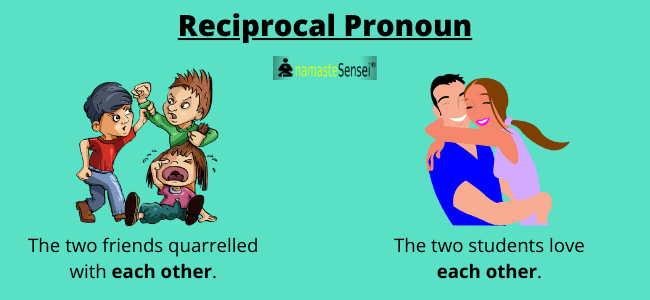
Definition of reciprocal pronoun
- Each other and One another are two reciprocal pronouns. (Each other and One another परस्परतावाचक सर्वनाम है।)
Example of Reciprocal Pronoun
- The two friends quarrelled with each other. (दोनों दोस्त आपस में झगड़ पड़े।)
- They all gave gifts to one another. (सबने एक दूसरे को उपहार दिए।)
- These two students love each other. (ये दोनों छात्र एक दूसरे से प्यार करते हैं।)
- They saved themselves by helping one another. (उन्होंने एक दूसरे की मदद कर अपनी जान बचाई।)
-
Demonstrative Pronoun in hindi (संकेतवाचक सर्वनाम)

Definition of demonstrative Pronoun
- This, That, These are demonstrative Pronoun. The verb is used just after them. (This, That, These संकेतवाचक सर्वनाम हैं। क्रिया का प्रयोग उनके ठीक बाद किया जाता है।)
Examples of Demonstrative Pronoun (संकेतवाचक सर्वनाम के उदाहरण)
- This is the gift from my mother. (यह मेरी माँ का उपहार है।)
- That is the Tajmahal. (वही ताजमहल है।)
- These are the books, I found in the bag. (ये वो किताबें हैं, जो मुझे बैग में मिलीं।)
- That is my house. (यह मेरा घर हैं।)
- In the above sentences (is, are) are transitive verb just after the Demonstrative Pronouns. (उपरोक्त वाक्यों में (is, are) सकर्मक क्रिया हैं, जो संकेतवाचक सर्वनाम के ठीक बाद में आती हैं।)
- Also in the following sentences (gift, TajMahal, books & house) are the objects that Demonstrative pronoun points. (इसके अलावा निम्नलिखित वाक्यों में (उपहार, ताजमहल, किताबें और घर) वे वस्तुएं हैं जो संकेतवाचक सर्वनाम point करती हैं।)
-
Indefinite Pronoun in Hindi (अनिश्चितवाचकसर्वनाम)
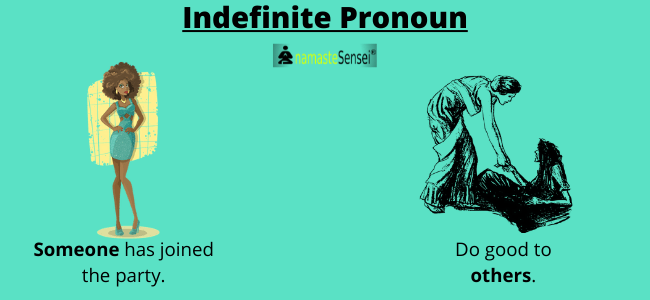
Definition of Indefinite Pronoun
- A pronoun that refers to person or thing in a general way (not a definite way) is called indefinite pronoun. (जिस सर्वनाम से किसी व्यक्ति या वस्तु का सामान्य रूप से बोध हो (निश्चित तरीके से नहीं) उसे अनिश्चितवाचक सर्वनाम कहते हैं।)
- Indefinite Pronouns do not reveal a certain person or thing. (अनिश्चितवाचक सर्वनाम किसी व्यक्ति या वस्तु का बोध नहीं कराते।)
- Some, One, Someone, All, A few, Others, No one, Nobody, Anyone etc. are indefinite pronoun. (Some, One, Someone, All, A few, Others, No one, Nobody, Anyone आदि अनिश्चितवाचक सर्वनाम हैं।)
Examples of Indefinite Pronoun (अनिश्चितवाचक सर्वनाम के उदाहरण)
- Some have joined the party. (कुछ पार्टी में शामिल हो गए हैं।)
- All went to Jaipur. (सभी जयपुर गए।)
- Someone has stolen my wallet. (किसी ने मेरा बटुआ चुरा लिया है।)
- A strict diet is appropriate for only a few. (सख्त आहार केवल कुछ के लिए उपयुक्त है।)
- Do good to others. (दूसरों का भला करो।)
- One must avail oneself of every good opportunity. (हर अच्छे अवसर का लाभ उठाना चाहिए।)
- One should mind one’s own business. (व्यक्ति को अपने काम पर ध्यान देना चाहिए।)
- Some passengers were injured. (कुछ यात्री घायल हो गए।)
-
Interrogative Pronoun in Hindi (प्रश्नवाचक सर्वनाम)
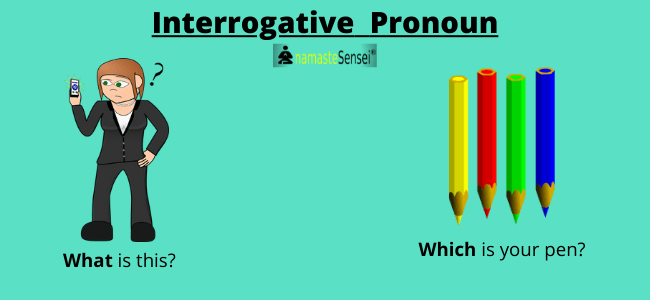
Definition of interrogative Pronoun
- Who, Whom, Whose, Which, What are interrogative Pronouns. Interrogative pronouns are used for asking questions or making queries. (Who, Whom, Whose, Which, What प्रश्नवाचक सर्वनाम है। प्रश्नवाचक सर्वनाम प्रश्न पूछने के लिए उपयोग किया जाता है।)
Example of Interrogative Pronoun (प्रश्नवाचक सर्वनाम के उदाहरण)
- What is that? (वो क्या है?)
- Who is he? (वह कौन है?)
- Which is your pen? (आपकी कलम कौन सी है?)
- What is your name? (तुम्हारा नाम क्या हे?)
- Whose bag is this? (यह किसका बैग है?)
- Whom do you want to talk? (आप किससे बात करना चाहते हैं?)
All of the underlined words above are Interrogative Pronouns. (ऊपर रेखांकित सभी शब्द प्रश्नवाचक सर्वनाम हैं।)
-
Distributive Pronouns in hindi (विभाजकवाचक सर्वनाम)

Definition of distributive Pronoun
- Each, Everyone, Either and Neither are distributive pronouns. Distributive pronoun expresses a person or a thing. (Each, Everyone, Either and Neither विभाजकवाचक सर्वनाम हैं। विभाजकवाचक सर्वनाम किसी व्यक्ति या वस्तु को व्यक्त करता है।)
Examples of Distributive Pronoun (विभाजकवाचक सर्वनाम के उदाहरण)
- Each of the student got prize. (प्रत्येक छात्र को पुरस्कार मिला है।)
- Each got his turn. (प्रत्येक को अपनी बारी मिली।)
- Either of the two will win the race. (दोनों में से कोई एक रेस जीतेगा।)
- Neither of those two students can secure first position. (उन दो छात्रों में से कोई भी प्रथम स्थान सुरक्षित नहीं कर सकता है।)
- Everyone of the students was happy. (सभी छात्र खुश थे।)
- Each of the two students received a medal. (दोनों छात्रों में से प्रत्येक को एक पदक मिला।)
-
Relative Pronoun (संबंधवाचक सर्वनाम)
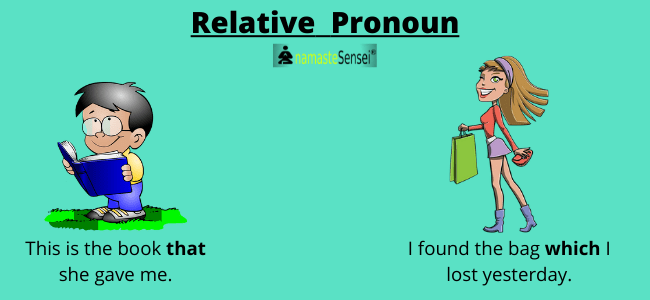
Definition of relative Pronoun
- Who, Which, That, What, Whose, Whose are relative pronouns. (Who, Which, That, What, Whose, Whose संबंधवाचक सर्वनाम है।)
- Relative Pronoun refers to the noun which comes before them. Such nouns are antecedents of relative pronoun. (संबंधवाचक सर्वनाम से उनके सामने आने वाली संज्ञा का बोध होता है।)
Example of Relative Pronoun. (संबंधवाचक सर्वनाम के उदाहरण)
- I know Mohan who has just gone out. (मैं मोहन को जानता हूं जो अभी–अभी निकला है।)
- This is the book that she gave me. (यह वह किताब है जो उसने मुझे दी थी।)
- I have found the bag which I lost yesterday. (मुझे वह बैग मिल गया है जो मैंने कल खो दिया था।)
- In the above sentences Mohan, Book and Bag are antecedents of relative pronouns who, that and which. (उपरोक्त वाक्यों में मोहन, पुस्तक और थैला संबंधवाचक सर्वनाम who, that and which के antecedents है।)
-
Exclamatory Pronoun in hindi (विस्मयवाचक सर्वनाम)

Definition of exclamatory Pronoun
- A pronoun used as an exclamation is called an Exclamatory Pronoun. (जिस सर्वनाम को विस्मयवाचक के रूप में प्रयोग किया जाता है, उसे विस्मयवाचक सर्वनाम कहते हैं।)
Example of Exclamatory Pronoun (विस्मयवाचक सर्वना के उदाहरण)
- What ! You don’t know Christiano Ronaldo? (क्या ! आप क्रिस्टियानो रोनाल्डो को नहीं जानते हैं?)
- What ! You lost your gold chain? (क्या ! आपने अपनी सोने की चेन खो दी?)
In the above sentence ‘What’ is an Exclamatory Pronoun. (उपरोक्त वाक्य में ‘What’ एक विस्मयवाचक सर्वनाम है।)
Congratulations, you have finished Pronoun in hindi. If you have any doubts or queries, leave a comment below. We will respond as soon as possible.
Or Email Us At support@namastesensei.in
More Articles:
Any topic you want us to cover. Let us know.
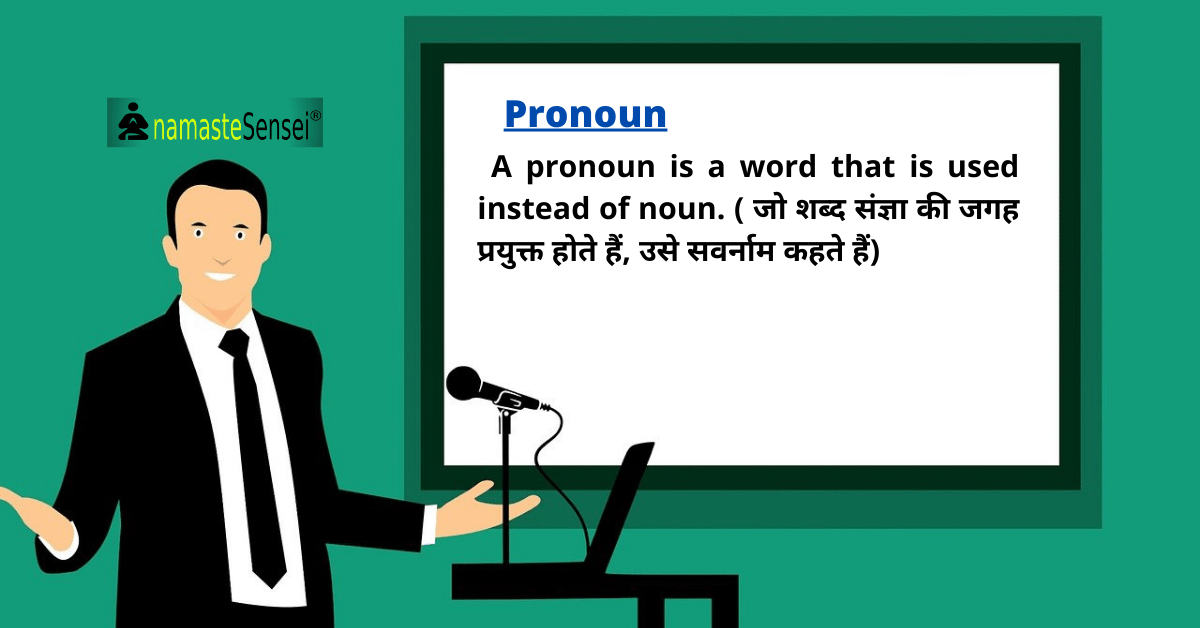
The contents here is very knowledgeable
Thank you, Sonu. We are happy that we provided some value to you.